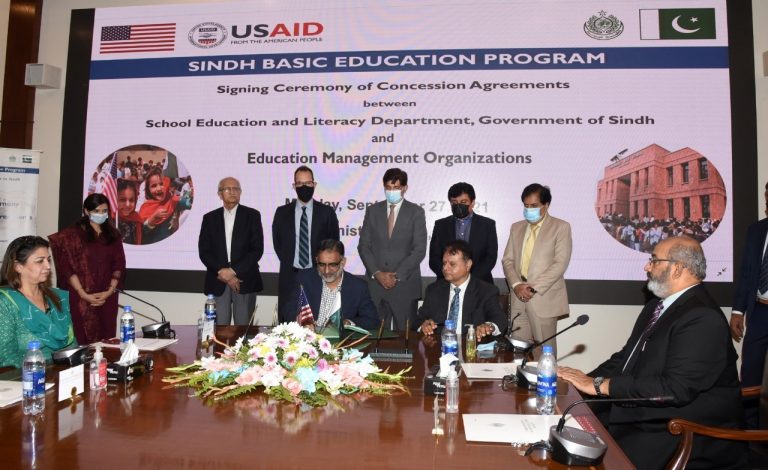
The schools have been outsourced for 10 years to Sindh Madressah Boad, Dar-e-Arqam and MDZed (Pvt); so far 90 schools have been handed to private sector.
Karachi: Sindh government has outsourced operational management of 32 public sector schools, including 13 schools built with USAID funding, to the private sector parties.
Thirteen USAID-funded schools were constructed under USAID’s Sindh Basic Education Program (SBEP).
The agreements-signing ceremony between Sindh Government and Education Management Organizations (EMOs) was held here at CM House on Monday.
Secretary School Education Akbar Laghari and office bearers from three successful EMOs – Sindh Madressah-tul-Islam Board (SMB), Dar-e-Arqam Schools (Pvt.) Ltd. and MDZed (Pvt.) Ltd – signed the agreements to manage these schools for a period of 10 years.
Under these agreements, SMB will manage four newly constructed USAID schools and 10 other select Sindh government Schools in Malir and West districts of Karachi. The Dare-e-Arqam Schools (Pvt.) Ltd. will manage four newly constructed schools and four grouped schools in district Qambar Shahdadkot, and MDZed (Pvt.) Ltd. will manage five newly constructed schools and five other Sindh government schools in districts Kashmore and Jacobabad.
The ceremony was attended by Sindh Chief Minister Syed Murad Ali Shah, Minister Education Syed Sardar Ali Shah, United States Consul General Mr. Mark Stroh, and other officials from the United States Agency for International Development (USAID) and Sindh Basic Education Program.
The U.S. Government through USAID is contributing $159.2 million for the SBEP whereas the Sindh government is also providing $10 million cost share for the same. The project aims at increasing and sustaining the enrolment of young students by developing learning environment in Sindh government’s schools in select areas of the province, with a special focus on bringing girls back to the schools who have dropped out of schools.
In addition to constructing schools, SBEP also strengthens the Government’s broader Sindh Education Reform Program by supporting provincial government’s policy of consolidating, merging and upgrading schools in target districts, strengthening community engagement, fostering public-private partnerships and improving reading competencies of young students.
Chief Minister Syed Murad Ali Shah expressing his sincere appreciation for the continued support of the U.S. government in modernizing education in the province acknowledged that the Sindh Basic Education Program me (SBEP) has been a successful initiative which is breaking new grounds and setting new standards.
“The Sindh Basic Education Program is helping to improve quality of the teaching & learning process and is increasing equitable access to safe learning opportunities for children, especially the girls”, said US Consul General, Mr. Mark Stroh while addressing the audience during the event. He also reaffirmed the U.S. Government’s commitment to support key facets of basic education in Pakistan.
USAID’s SBEP supports the reconstruction of 106 Sindh government schools affected by the catastrophic 2010 floods. These 106 state-of-the-art school buildings are being reconstructed in seven districts of Northern Sindh (Dadu, Jacobabad, Kamber-Shahdadkot, Kashmore, Khairpur, Larkana, and Sukkur) and three selected districts of Karachi Division (Malir, West and South). The reconstructed schools along with a group of other Government schools are being handed over to the EMOs for improved operational efficiency.
With the signing of these concession agreements, the operational management of 81 SBEP-USAID reconstructed schools along with a group of 90 select government schools stands outsourced to 10 EMOs. The construction of the remaining 25 schools is in process and is at different stages of completion. (PR)
_______________________